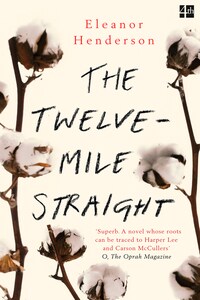4th Estate
An imprint of HarperCollinsPublishers
1 London Bridge Street
London SE1 9GF
www.4thEstate.co.uk
First published in Great Britain by 4th Estate in 2017
First published in the United States by Ecco, an imprint of HarperCollinsPublishers, in 2017
This eBook edition published in 2017
Copyright © 2017 by Eleanor Henderson
Eleanor Henderson asserts the moral right to be identified as the author of this work in accordance with the Copyright, Designs and Patents Act 1988
A catalogue record of this book is available from the British Library
Grateful acknowledgment is made to the Franklin D. Roosevelt Presidential Library and Museum in Hyde Park, New York, for reprinted excerpts here of Franklin D. Roosevelt’s November 28, 1930, Warm Springs, Georgia, radio address, http://www.fdrlibrary.marist.edu/_resources/images/msf/msf00416.
This is a work of fiction. The names, characters and incidents portrayed in it either are the work of the author’s imagination or are used fictitiously. Any resemblance to actual persons, living or dead, events or localities is entirely coincidental.
All rights reserved under International and Pan-American Copyright Conventions. By payment of the required fees, you have been granted the non-exclusive, non-transferable right to access and read the text of this e-book on screen. No part of this text may be reproduced, transmitted, down-loaded, decompiled, reverse engineered, or stored in or introduced into any information storage and retrieval system, in any form or by any means, whether electronic or mechanical, now known or hereinafter invented, without the express written permission of HarperCollins.
Source ISBN: 9780008158682
Ebook Edition © September 2017 ISBN: 9780008158712
Version: 2018-06-04
And the children struggled within her; and she said, If it be so,
why am I thus? And she went to inquire of the Lord.
And the Lord said unto her, Two nations are in thy womb.
—GENESIS 25:22–23
GENUS JACKSON WAS KILLED IN COTTON COUNTY, GEORGIA, on a summer midnight in 1930, when the newborn twins were fast asleep. They lay head to toe in a cradle meant for one, Winnafred on one side and Wilson on the other. In their overstuffed nest, with the delicate claws of their fingers intertwined and their eyelids trembling with blue veins, they looked like a pair of baby chicks, their white skullcaps like two halves of the single eggshell from which they’d hatched. Only if you looked closely—and people did—could you see that the girl was pink as a piglet, and the boy was brown.
“He’s just complected dark,” Elma had told her fiancé, Freddie Wilson, that afternoon, when he’d peeked into the cradle for the first time. “It’s my great-great-granddaddy’s Indian blood.”
“He don’t look like no Indian,” said Freddie, who was as freckled as Elma, with hair as pale and straight as straw.
It was Elma’s father, Juke—who’d nearly killed Freddie himself for failing to make her his proper wife—who first accused Genus Jackson. Nine months back was harvest. There were plenty of colored men who worked as Juke’s field hands in October, boys Juke picked up every morning in the Fourth Ward and piled in the bed of his Ford—civilized, God-fearing, Cotton County Negroes. But Genus was the one Juke had hired year-round, who’d moved into the tar paper shack behind their house after he showed up on the Twelve-Mile Straight looking for work, his clothes still black with the soot of the boxcar he’d leapt from. Juke had pitied him, folks said, for that was the kind of man Juke Jesup was. He’d give his last cow to the devil if the devil was hungry. He had a soft spot for colored folks, had liked to drink and dance with them since he was a boy—why else was he called Juke? So he kept Genus on even after he was discovered with a stolen pint of Juke’s gin, even after he was discovered last fall in the barn with Elma. He should have run him off the farm then. George Wilson, who was Freddie’s grandfather and the landlord, had told him as much. But instead Juke had given him another chance and a beating to remember. “You old enough to know better than to be found with no darky,” he told his daughter, who was eighteen.
Late on Saturday night, coming up on Sunday, Juke and Freddie and three other trucks full of men left the mill village, drove to the farm, and walked the twenty paces across the scrubgrass yard from the house to the shack. Genus was asleep on his cot when the men came in without knocking, hauled him up by the collar, and threw him out onto his knees. He was wearing shoes on his feet, a pair of alligator boots. What kind of man but a guilty one slept in his shoes? Juke had never liked those boots. He shouldn’t have trusted a man in those boots. The man took off down the dirt road like a swamp rabbit out of a briar patch, as though he’d already been running in his dreams.








